
Nepal: Everest Basecamp + Lobuche East + 2 High Passes
Everest Base Camp trek, the world’s most awe inspiring and iconic mountain trail trek takes us to the backyard of the world famous Sherpas, the culture of colorful prayer flags and Buddhism, the quaint Namche Bazzar, the Sagarmatha National Park, and the mightiest view point-Kala Patthar. Everest Base Camp trek has the reputation of being the grandest walk in the land of the Himalayas. It begins with an inspiring mountain flight to Tenzing-Hillary Airport at Lukla and gets better as you go.
On this expedition, we will also cross two high passes with spectacular vistas of countless Himalayan giants, climb Gokyo Ri before culminating in an attempt on 20,070ft Lobuche East, in the heart of the Khumbu.
CLIMB DETAILS
Price: $4250 Per Person
Length: 20 days
Guide-to-Client Ratio: 1:4
Difficulty: Strenuous
When: Check Back Soon
Type: Trekking + Mountaineering
Type: Experiential
A non-refundable deposit of $750 per person secures your reservation. Payments may be made via MasterCard, Visa, American Express, or check.
INCLUDED
- All arrival and departure transfer
- 3 nights in Kathmandu with bed & breakfast
- All meals throughout the trek/climb
- All accommodation during the trek
- A half day sightseeing tour in Kathmandu valley including tour guide and monumental fees
- Domestic flights and airport departure taxes
- An NEM Guide
- Experienced English-speaking trek leader (trekking guide)
- Assistant guide also known as Sherpa
- Porters to carry luggage (2 trekkers:1 porter)
- Down jacket, four seasonal sleeping bag, Himalayan Hikers Trekking duffel bag and trekking map (down jacket and sleeping bag, cotton liner are to be returned after trip completion)
- All necessary paper work and permits (National park permit, Climbing permit, TIMS and insurance of the staff)
NOT INCLUDED
- Nepal Visa fee (bring accurate USD cash and two passport photographs)
- International airfare to and from Kathmandu
- Excess baggage charges
- Extra night accommodation/s in Kathmandu because of early arrival, late departure or early return from the mountain (due to any reason) than the scheduled itinerary
- Lunch and evening meals in Kathmandu (and also in the case you return early from the mountain than the scheduled itinerary)
- Travel and rescue insurance in case of Heli Evacuation
- Personal expenses (phone calls, laundry, bar bills, battery recharge, extra porters, bottle or boiled water, shower etc)
- Gratuity for guides and porters
BE INFORMED. BE PREPARED.
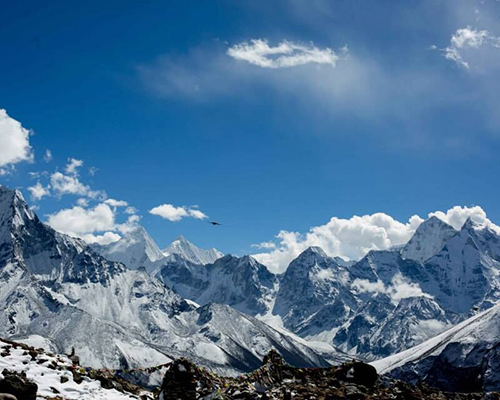
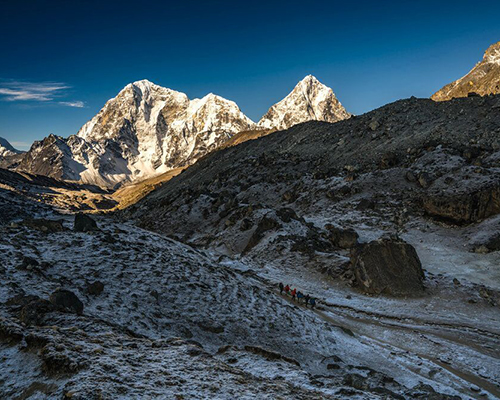
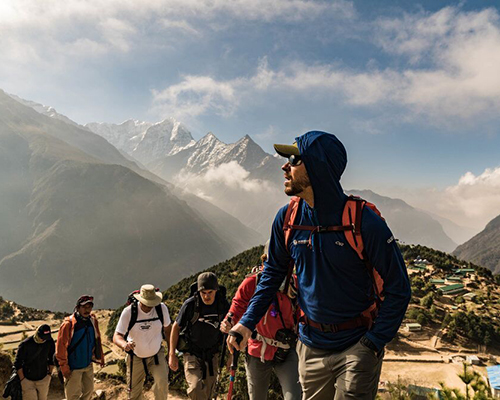
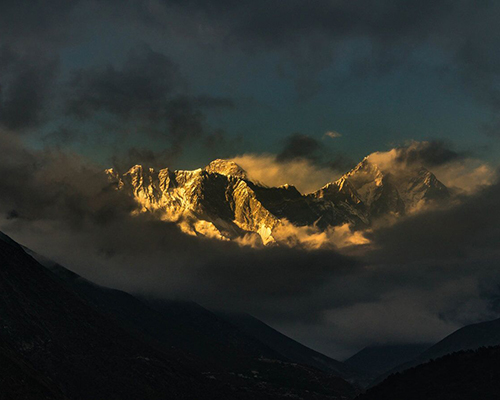
Itinerary
Day 1: Kathmandu (1360m)
Upon arrival in Kathmandu, you will be met by your NEM and Nepalese guides and transferred to the hotel. The drive from the airport to the hotel is around 20 minutes. The evening is free but your guides will organize a welcome dinner at a fine local restaurant. Overnight in Kathmandu.
Day 2: Kathmandu (1360m)
Today, you will visit Bodhnath Stupa, one of the biggest Buddhist shrines in the world and Pashupatinath, the main temple for the Hindus. Here you will see Hindu holy men (sadhus) meditating, pilgrims bathing, and occasionally funeral pyres burning on the “Ghats”. The rest of your afternoon is free. In the late afternoon you will be handed over with your expedition duffel, parkas, and sleeping bags. Departure information for the next morning will also be given. Included meals: Breakfast
CLIMBING ITINERARY BEGINS
Day 3: Fly to Lukla (2,800m/9,184ft) then trek to Phakding (2,652m/8,700ft): 40 min flight, 3-4 hours trek
After breakfast, we will be taken to the domestic terminal of TIA for an earlymorning flight to Lukla. After flying amongst the Himalayan giants, we reach Tenzing-Hillary Airport at Lukla. This is one of the most beautiful flights in the world. Upon our arrival at Lukla, we meet remaining members of our team. We begin our trek through the prosperous village of Lukla until we reach Phakding. To assist in acclimatization, we only have a short hike today. If interested in additional activities, we can take a side trip to a nearby monastery. Overnight in Phakding. Included meals: Breakfast, Lunch, Dinner
Day 4: Phakding to Namche Bazaar (3,440m/11,283ft): 5-6 hours
After breakfast, we walk through beautiful pine forests and then along the Dudh Koshi River. After walking about an hour, we come across the glistening Mt. Thamserku (6,608m) on our right. If the weather is clear, we may even catch a glimpse of Mt. Everest peering over the Lhotse-Nuptse ridge. We continue walking until we reach the entrance to Sagarmatha National Park, Namche Bazaar, the gateway to Mt. Everest and main trading center of this region. Overnight in Namche Bazaar. Included meals: Breakfast, Lunch, Dinner
Day 5: Namche Bazaar (3,440 m/11,283 ft.): Acclimatization Day
This is the day set aside for acclimatization.There are a few options set aside for this day. We can either stroll around Namche’s quaint villages to experience the Sherpa people and their rich culture, or we can hike up to the Everest View Hotel and enjoy an up-close view of the Mt. Everest, Ama Dablam and Lhotse. Overnight in Namche Bazaar. Included meals: Breakfast, Lunch, Dinner
Day 6: Namche Bazaar to Thame (3736m/12255 ft): 5 - 6 hours
Our trail heads west along the valley of the Bhote Koshi River. The views of the Himalayas including Kongde Ri (6187 m), Khumbi Yul La (5765 m), Kusum Kanguru (6,373 m) are fantastic. The first village we pass through is Phurte where Sir
Edmund Hillary’s Himalayan Trust established a nursery. We continue along the balcony path. After descending to the river, we cross a bridge before making a steep climb to Thame, situated at an important juncture along the old primary trade route to and from Tibet via the Nangpa La (pass). Overnight in Thame. Included meals: Breakfast, Lunch, Dinner
Day 7: Thame to Lumde (4368 m/14328 ft): 3- 4 hours
After breakfast we visit Thame Gompa which is a 350-year- old monastery beautifully located in the cliffs above Thame. After spending some time here we continue our trek to Lumde. The trail climbs gently over the moraine and continues our ascent to Lumde. We follow the route used for centuries by the Himalayan traders who ferried salt and grains across the Nangpa-La pass into Tibet. Overnight in Lumde. Included meals: Breakfast, Lunch, Dinner
Day 8: Lumde to Gokyo via Renjo La Pass (5360m/17585 ft): 7 - 8 hours
Today we cross the first of the three passes, Renjo-La. It is a tough climb but the view from the top makes the climb worthwhile. As we trek further we see prayer flags that signal the pass. The view from the top of the pass is spectacular. We see Gokyo Lakes, Ngozummpa Glacier, Everest, Lhotse and other Himalaya peaks. From here we descend to Gokyo. Overnight in Gokyo. Included meals: Breakfast, Lunch, Dinner
Day 9: Acclimatization Day in Gokyo Valley: Hike to Gokyo Ri (5,330 m/17,483ft)
If the weather is good, we will climb Gokyo Ri and enjoy amazing mountain vistas from the best viewpoint of the Everest Region. Climbing Gokyo Ri is strenuous as it is steep and takes about 3 to 4 hours to reach the top. At the summit more than 10 mighty Himalayas surround us. If the weather is not fit for climbing, we visit the fourth and fifth Gokyo lakes. Overnight in Gokyo. Included meals: Breakfast, Lunch, Dinner
Day 10: Gokyo to Thaknak (4750 m/15,580 ft): 5-6 hours
If the weather was not good for climbing Gokyo Ri the previous day, we will do so today. After breakfast, we climb out of Gokyo village to a ridge then trek through the Ngazumpa Glacier. A long traverse brings us to Thaknak. It will be a short
hike today with an afternoon of rest, which will prepare us for long hiking days and elevation gain to come. Overnight in Thaknak. Included meals: Breakfast, Lunch, Dinner
Day 11: Thaknak to Cho La pass (5367 m/17,604 ft) to Lobuche (4940 m/16,207ft): 8-10 hours
Today is going to be one of the toughest days of the trip. The Cho La pass is not difficult, but it is steep and involves a glacier traverse on the eastern side. We need to be careful as the trail is vertical and the rocks glazed by ice may make the trail slippery. The trail from Phedi climbs through a ravine and a rocky trail. While trekking along the side of a frozen lake, we reach at the top of the pass, which is decorated with prayer flags. The pyramidal Ama Dablam presides over a range of mountains on the South as Cholatse soars to the west and Lobuche East and Baruntse rises sharply to our right. We need to pass through some crevasses before we reach Dzongla, another beautiful place with a complete view of Mt. Cholatse, Mt. Ama Dablam, Lobuche Peak and the Pheriche Village far below. We climb down from Dzongla and walk through a grassy trail while enjoying the view of Lobuche Peak. The trail curves through the wide riverbed before reaching Lobuche. Overnight in Lobuche. Included meals: Breakfast, Lunch, Dinner
Day 12: Lobuche to Gorak Shep (5170 m/16,961ft), visit Everest Base Camp (5364 m/17,594 ft): 6-7 hours
We take the trail to Everest Base Camp through the once vast Gorak Shep Lake. The walk is strenuous due to thin air in the high altitude. We pass through rocky dunes, moraine and streams before reaching Everest Base Camp. Nuptse, Khumbuste and Pumori are seen from base camp. We then get back to Gorak Shep for a good nights rest. Overnight in Gorak Shep. Included meals: Breakfast, Lunch, Dinner
Day 13: Gorak Shep to Kala Patthar (5545m/18,192ft] and back to Lobuche (4940m/16,207ft): 7-8 hours
We prepare for an early morning departure, amid pre-dawn darkness and cold temperatures. Familiar peaks such as Lingtren, Khumbutse, and Changtse tower to the East as Everest begins to reveal itself. But it is upon reaching Kala Patthar that we get a 360-degree up-close views of Mt. Everest. We take pictures, enjoy the magnificent mountain panorama, and then return back to Lobuche. Overnight in Lobuche. Included meals: Breakfast, Lunch, Dinner
Day 14: Lobuche to High Camp (5,400m/17,712ft): 3-4 hours
From Lobuche, we trek towards Lobuche base camp. After walking on relatively flat ground, the path to Lobuche Base Camp gets steeper and rugged. We push on along the Lobuche Glacier while enjoying great views of Ama Dablam, Cholatse, Pokalde, Thamserku, Kantega and other Himalayas. From base camp, we continue on a rocky moraine path to reach the High Camp. After reaching camp, we’ll have lunch and rest. For the climb, we will be climbing on dirt and rock until 5770m. Above this, we
climb on snow and ice and use ropes when necessary. Fixed rope is used for much of the ascent. Overnight in Lobuche East High Camp. Pre-Climb Training: Your guides will provide training on climbing techniques including the use of an ice axe, crampon technique and fixed rope travel. We strongly believe that the training experience will boost your confidence and climbing skills to increase the chances of reaching the summit. Included meals: Breakfast, Lunch, Dinner
Day 15: Lobuche High Camp to Summit (6119m/20,070 ft) and back to High Camp: 8-10 hours
We wake up around midnight and begin our climb. It is important we reach the summit before noon before strong afternoon winds hit. Lobuche East offers more views of the other Himalayan peaks than any other “trekking” peak. From the summit, you get to enjoy magnificent views of Everest, Lhotse, Nuptse, Ama Dablam, Cholatse, Pumori, and many more. We spend some time at the summit celebrating and taking pictures, and then descend back to High Camp for an overnight stay. Included meals: Breakfast, Lunch, Dinner
Day 16: Lobuche High Camp to Pangboche (3930m /12900 ft): 8-9 hours
After breakfast, we descend from Lobuche High Camp and rejoin the Everest Base Camp route in Lobuche. From Lobuche we begin our descent to Pangboche. The trail is often covered in pink and red rhododendron flowers. Upon reaching Pangboche we may also consider visiting the famous Pangboche Monastery. Included meals: Breakfast, Lunch, Dinner
Day 17: : Pangboche to Namche Bazaar: 4-5 hours
From Pangboche, descend to the Imja Khola and up through the forest to Tengboche. If interested, we can also visit the Tengboche Monastery. After lunch at Tengboche, we continue through the hillside blanketed by rhododendron and juniper trees. After crossing the bridge over the Dudh Koshi River, our trail follows the Dudh Koshi gorge descending rapidly through the pine forests before reaching Sanasa. We’ll keep a lookout for wildlife such as mountain goats, snow leopards, colorful pheasants. Overnight in Namche Bazaar. Included meals: Breakfast, Lunch, Dinner
Day 18: Namche Bazaar to Lukla: 6-7 hours
The trail out of Namche descends steeply. After crossing the suspension bridges over the fast flowing Dudh Koshi and its tributaries, the trail levels out. After our arrival in Lukla, we enjoy a celebratory team dinner including some Nepalese dancing. Overnight in Lukla. Included meals: Breakfast, Lunch, Dinner
CLIMBING ITINERARY ENDS
Day 19: Fly to Kathmandu
We catch an early morning flight to Kathmandu after our long mountain journey. After reaching Kathmandu, we can rest or do some souvenir shopping. If we want to explore any other areas of Kathmandu, we may do that today. There will be a farewell dinner in the evening to celebrate the successful completion of our journey. Overnight in Kathmandu. Included meals: Breakfast, Dinner
Day 20: International Departures
Gear List
RENTALS AVAILABLE AT CLIMBINGRENTALS.COM
Most of the required equipment [listed below] is available for rent from our affiliate mtnGEAR.
NEM climbers will receive an exclusive discount of 20% discount on all rental equipment and clothing.
Mandatory Items |
Guides Pick |
| [ ] Pack with Waist Strap: A 30-40L pack is the recommended size for one day climbs. Your pack MUST have a waist strap. A backpack will not suffice. | Hyperlite Mt Gear - 2400 Ice Pack |
| [ ] Crampons: 10-12 point adjustable crampons designed for mountaineering | Black Diamond Contact |
| [ ] Ice Axe: An ice axe designed for general mountaineering. | Black Diamond Raven Pro |
| [ ] Helmet: A lightweight climbing helmet. | Petzl Sirocco |
| [ ] Harness | Petzl Sitta |
| [ ] Warm Hat: Wool or synthetic. It should be warm and thin enough to fit underneath a climbing helmet. | OR Gradient Hat |
| [ ] Buff/Neck Gaiter: Buff makes the best option. | Buff Merino Wool |
| [ ] Ball Hat/Sun Hat: Optional. A lightweight ball cap or sun hat. | |
| [ ] Sun Glasses: A pair of dark-lensed sunglasses with side shields or full wrap-type sunglasses. | Julbo Tamang |
| [ ] Lightweight glove: One pair of fleece gloves. | OR Sensor OR Catalyzer [W] |
| [ ] Medium Weight Glove: Wind/water resistant insulated mountain gloves. | OR Ambit OR Ambit [W] |
| [ ] Heavy Insulated Mitten: Wind/water resistant, insulated mittens for protection against wind, snow and cold. These also serve as emergency back-ups if you drop or lose a glove. | OR High Camp OR Highcamp [W] |
| [ ] Light Insulating Layer/Soft Shell Top: A fleece or other insulation layer. | Arcteryx Gamma MX Hoody Arcteryx Gamma MX Hoody [W] |
| [ ]Hard Shell Jacket with Hood: Wind/rain Proof. Gore-Tex recommended. | Arcteryx Beta LT Arcteryx Beta SL [W] |
| [ ] Insulated Parka: This item becomes of highest importance when we are faced with poor weather. This should be an expeditionary-type heavy parka that extends well below the waist and above the knees. Goose down is recommended versus synthetic fill. It does not have to be waterproof, but that is a nice feature. The parka is worn primarily at rest breaks on summit day and as an emergency garment if needed. When sizing a parka, allow for several layers to be worn underneath; buy it large. The parka must have an insulated hood. | OR Incandescent Arcteryx Cerium LT [W] |
| [ ] Climbing Pants: Synthetic climbing pants offer a wide range of versatility. You can wear them alone on hot days, or in combination with the base layer on cold days. The thickness (insulation quality) should be based on how well you do in the cold. For most of our adventures snow pants will suffice. | Mountain Hardwear Chockstone Arcteryx Gamma AR [W] |
| [ ] Hard Shell Pants: A pant made of breathable rain and wind-proof material will be needed. Full-length side zippers are required for facilitating quick clothing adjustments over boots and crampons in cold, inclement weather. | Marmot Precip Full Zip Marmot Precip Full Zip [W] |
| [ ] Mountaineering Boots: Insulated plastic boots are the preferred choice for winter mountaineering. They provide the best insulation as well as a more rigid sole for kicking steps and holding crampons. Leather mountaineering boots that have completely rigid soles are also adequate, but they will need to be insulated and may still result in cold feet above treeline. Lightweight hiking boots without insulation are not acceptable as they don’t work well with crampons, or in very cold or wet weather. Winter boots are not acceptable unless they adequately hold a crampon. Check out A Guides View: Selecting Mountaineering Boots. | La Sportiva Batura Lowa Weisshorn GTX [W] |
| [ ] Gaiters: A knee-length pair of gaiters, large enough to fit over your mountaineering boots. This will protect you from catching your crampons on loose clothing. | OR Crocodiles OR Crocodiles [W] |
| [ ] Headlamp: | Petzl Reactik |
FAQ'S
Is Nepal Safe?
Yes. The people of Nepal are extremely friendly. Their economy is supported by foreign currency so they may ask you to visit their stores but they will not beg. You should feel safe and secure in Nepal.
Do I need to purchase additional insurance?
Yes. You can purchase a $5,000 rescue insurance policy from the American Alpine Club for $45. Additionally, we highly recommend that you purchase trip insurance. In the case where you trip is cut short, this is how you will get a full refund.
Do I need to bring extra medications?
Yes. You should bring basic medications in addition to any prescriptions that you need. Consider bringing a small kit with Ibuprofen, Tums, Ant-Acids, etc. Respiratory illness in the form of a cough and upset stomach are common issues associated with the altitude and diet.
Is the water safe to drink?
Yes. Boiled water is available at every tea house. We do recommend that you bring or purchase chlorine tablets to ensure that the water is potable.
Do I need a warm sleeping bag?
No. You will be provided with a -20 sleeping bag, a duffle bag for trekking and down parkas.
Is there cell service?
Yes, if you purchase a sim card in Nepal. You must go to your local provider before you leave to “unlock” your phone.
Can I recharge my batteries?
Yes. Each tea house has battery charging capabilities but they charge a few dollars per hour. If you own a portable solar panel charger then we recommend that you bring it.
Should I bring entertainment?
Yes. We recommend you bring a few books, playing cards and some music for down time at the tea houses.
Are showers available?
At limited tea houses they provide shower service. Showers cost approximately $5US. They will tell you that they are warm, but plan for a cold shower.
Is laundry available?
Yes. Some tea houses provide laundry service but it is quite expensive.
How many pairs of socks should I bring?
Plenty. We recommend 5-10 pairs.
What kind of shoes should I bring?
We recommend that you bring a sturdy pair of hiking boots and a pair of trail sneakers. Depending on the weather conditions, you may wear one or the other.
Should I bring any luxuries?
We recommend that you bring a designated change of warm, comfy clothes for lounging around the tea houses.
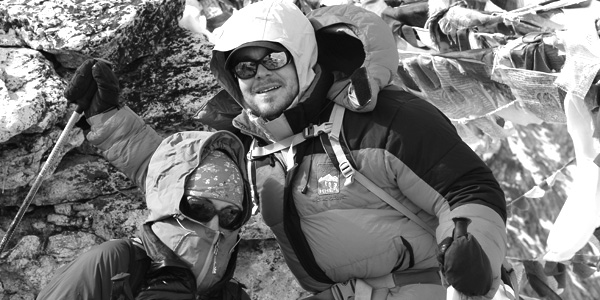
Skip Lobuche and Just Trek
For those looking to skip the climbing, we have a co-current itinerary for an Everest Base Camp Trek and the high passes. Everest Base Camp trek has the reputation of being the grandest walk in the land of the Himalayas. It begins with an inspiring mountain flight to Tenzing-Hillary Airport at Lukla and gets better as you go.

 We are proud to work with the Department of Agriculture, the White Mountain National Forest and the Androscoggin Ranger District where we are authorized outfitter guides.
We are proud to work with the Department of Agriculture, the White Mountain National Forest and the Androscoggin Ranger District where we are authorized outfitter guides.
